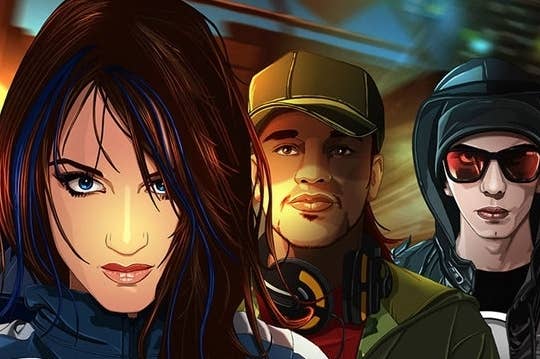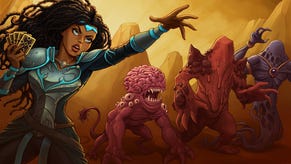NaturalMotion: Scaling from mobile studio to entertainment business
Acquisitions, new games and starting studios from scratch. CEO Torsten Reil is hungry for it all
NaturalMotion is one of the few companies in the mobile market that is in it for the long-term - to build a business that's more of just a handful of hit games squeezing consumer wallets until it's time to sell up or shut down.
According to CEO Torsten Reil, this is a golden age for entertainment, an opportunity to not only build a dominating mobile games business, but the time to create a world-class entertainment company to stand shoulder to shoulder with the biggest movie studios and games publishers. But the window won't be open forever, so the company needs to scale up through quality product rather than rest on its laurels and happily count the significant cash rolling in via hit games CSR Racing and My Horse.
In this exclusive interview with GamesIndustry International, Reil talks openly about the problems of thinking short-term, why fast following and cloned product in the mobile space is an error, the opportunity to acquire other businesses and NaturalMotion's plans to build new studios from scratch in the UK.
"There's a lot of fast following in mobile. The right way to approach this is do something original, not to chase revenues that already worked for somebody else"
It's significant in terms of it's our DNA. It's where we've come from. And it obviously drives our own games too, if you look at Clumsy Ninja, for example, we're using Euphoria for the interactive character where it adds a huge amount with touch screens. For GTA V there are two things. From a revenue point of view it's a part of our business but it's also important because it gave us an insight into working on one of the best games of all time. We're definitely driven by an obsession with quality and doing something that's fun for the user. Rockstar are the kings of that.
They have a genuine desire to do something cool for the user, to give them lots of things to do and make them feel good. Revenue follows from that. Revenue can't be your first driver. Your first driver has to be the product. It sounds cliched but it makes a huge difference.
If you look at what's happening right now in mobile gaming, there's a lot of fast following. There was always a lot of fast following but now there's a second wave of fast following. There are half a dozen clones of Clash of Clans, there are quite a few of CSR Racing and I don't think that's the right way to approach it. The right way to approach this market to be successful is do something original, really care about the product and the user, not to chase revenues that already worked for somebody else. Essentially that's the difference between the companies that are going to be successful long-term and the companies that are cash in mid-term and fizzle out.
"We make games for an audience where we think we can disrupt a particular genre. It's just a case of scaling one game to ten or twenty, that's the difficulty"
We will always keep the technology business. At our core we created the technology to do something magical and cool with it. But in terms of revenues our games are quite a lot bigger than the technology business. And that will continue to be the case.
As a creative company, less so. As a licensing company, absolutely. It's not something I would rule out but it depends entirely on whether the platforms understand what content providers want to do on those platforms and what the unit numbers are.
It's very competitive. You have to have some form of unique selling point for visibility, either to PR the platform or get enough people talking about the game to go viral. Otherwise it's very hard. Also, a lot of people just approach it naively. They just make a game. It maybe has good production values but it doesn't necessarily have the stickiness. And they make a game not necessarily for the mass market but for the hardcore, games that they would like to play and that doesn't really work that well on the iPhone.
I'm not interested in American football either. That's the thing. With cars we did have an interest. But we make games for an audience where we think we can disrupt a particular genre, and there are lots of them. The reason why we have so many games in development, and the reason we're trying to scale the company in a smart way, is it's a complete blue ocean out there. There are so many genres for mobile, it's just a case of scaling one game to ten or twenty, that's the difficulty.
"It's very rare that you have the opportunity to create a big entertainment company that really is meaningful. Now is one of those times"
That is the main thing we are currently focusing on. It's the most interesting question for us right now. What we have to make sure is that we're not a one or two IP company. It's already hard to make a hit game, no doubt about it, but what's much harder is being able to produce successful games in a reasonably predictable manner. The question is, how do you achieve that? Firstly, you've got to understand why your own games have been successful. Hopefully you understood some of that before it became successful because it's in the design process. But you have to understand afterwards how people play it, you analyse your data and see that some of your assumptions were wrong. Being able to learn from your own games is really important.
But the other side is you have to be able to disseminate the knowledge from your hit games into all the other teams that are making games. That is the biggest competitive advantage of companies that have had hit games. You have to be prepared to scale that up, to multiple teams and multiple studios, and put the process in place so all the teams talk together. Teams need to get together physically and get the culture across that the product is the number one thing that matters. Everyone has to absolutely buy into that and you'll stand a good chance of scaling it up.
But your observation that most of mobile companies are one or two hit companies is absolutely correct and it takes that leap to then create a bigger entertainment powerhouse.
It's a perfectly valid strategy. It depends on what you want to do with your games and achieve with your business. We have a big live team on CSR with lots of cool stuff coming up. But we also care about going on from there and creating something bigger. Because it's very rare that you have the opportunity to create a big entertainment company that really is meaningful. There was a time when consoles came out, and the same was true for movie studios, there are these transitional periods where you can do it. Now is one of those times. Focusing on existing games and making them work is fine but the opportunity costs of then not doing the hard work to try and grow and build additional teams to make more games is very big. If you don't try that at the beginning it's not going to happen a year later because the market will move on.
"We've got the capital to acquire additional companies. We're not interested in anyone who is just trying to make a quick buck"
We have a long term vision of building a big entertainment company. One of the world's leading entertainment companies. We already had that naively at the beginning but we got more and more confident when we found out that some of this stuff does actually work. Being hungry and thinking big makes all the difference. We've found that over the past 18 months and CSR Racing has helped us with that. It gave us a lot of confidence. You need that energy to power through the difficult parts. Scaling a company is hard and there's a lot of heavy lifting involved. With 220 people there are always thing that we have to fix, things that go worse that you expect. You've got to fix them. There are always building sites. You can only power through that if you have a genuine belief that there is something bigger you can create. We're going through that right now.
No, we would acquire additional companies. We've got the capital to acquire additional companies if it makes sense. It needs to be a cultural fit. And more than anything else there needs to be a hunger to do something amazing. We're not interested in anyone who is just trying to make a quick buck or just copy other games. There are a lot of games out there that copy other games and it doesn't show to us that they are able to creatively come up with solutions themselves. People that show they can think and try and create something new for the audience are where we're interested.
You'll see us starting up additional studios in the near future. We've got to have confidence that we get everyone born into the same culture. We're ambitious and obsessed with quality. We have often painful meetings where we push the quality even further, and that is best to do in person. Britain is one of the main areas we are interested in in terms of growing further. The challenge is unparalleled.









